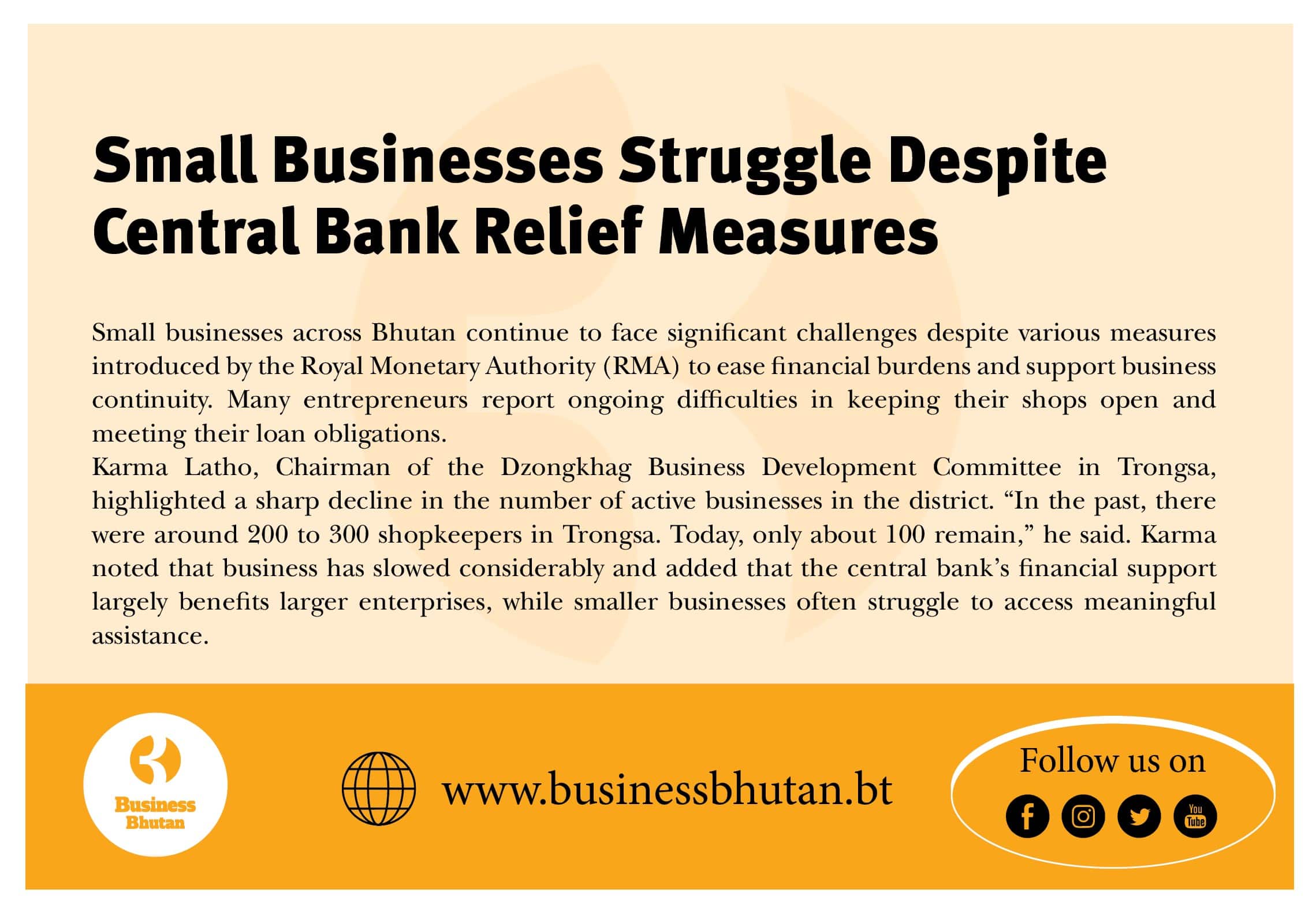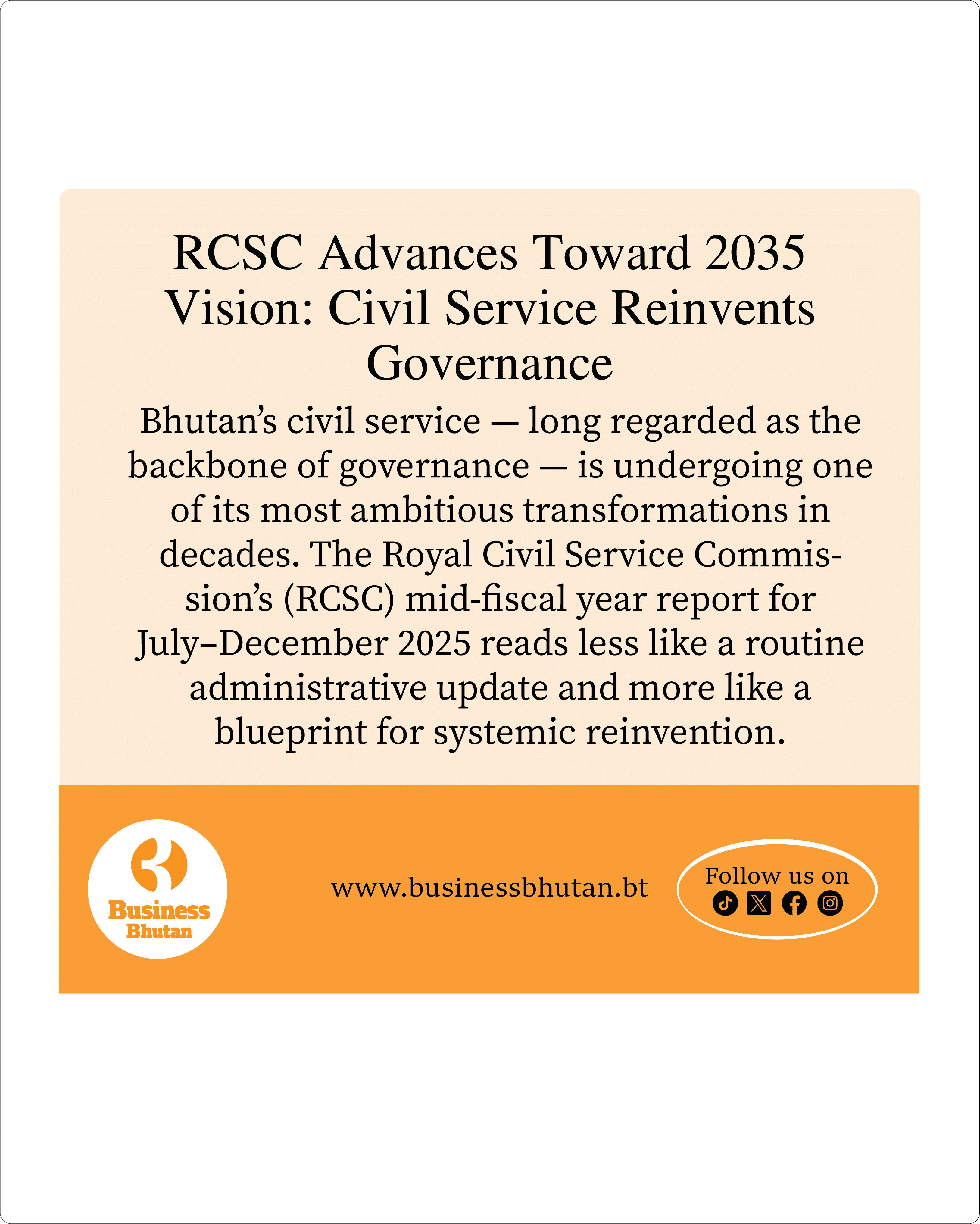Many shops have closed in some districts
Small businesses across Bhutan continue to face significant challenges despite various measures introduced by the Royal Monetary Authority (RMA) to ease financial burdens and support business continuity. Many entrepreneurs report ongoing difficulties in keeping their shops open and meeting their loan obligations.
Karma Latho, Chairman of the Dzongkhag Business Development Committee in Trongsa, highlighted a sharp decline in the number of active businesses in the district. “In the past, there were around 200 to 300 shopkeepers in Trongsa. Today, only about 100 remain,” he said. Karma noted that business has slowed considerably and added that the central bank’s financial support largely benefits larger enterprises, while smaller businesses often struggle to access meaningful assistance.
A similar situation prevails in Chhukha. Palay Dorji, Chairman of the Dzongkhag Business Development Committee in Chhukha, confirmed that business activity in the district remains sluggish, echoing the experiences of other regions.
In Wangduephodrang, Tharpa Lhamo, Chairman of the Dzongkhag Business Development Committee, reported that many small shops have been forced to shut down due to their inability to repay loans or afford rent. “Accessing loans remains a significant hurdle for small business owners. Even when loans are secured, repayment is a major challenge,” she said.
Tharpa explained that large businesses find it easier to secure financing as they are able to offer substantial collateral, such as property. “For small businesses, particularly those from outside Wangdue, the requirement to pledge collateral within their own Dzongkhags complicates access to credit,” she added.
According to Tharpa, approximately 20% of shops in Wangdue have closed. She further noted that small businesses are typically limited to borrowing up to Nu 300,000, an amount insufficient for many. Although business owners have repeatedly requested that banks increase the lending ceiling to between Nu 500,000 and Nu 700,000, these appeals have yet to yield results.
At present, only the Bhutan Development Bank Limited (BDBL) offers small business loans of Nu 300,000, while other financial institutions (FIs) largely refrain from lending to this segment.
Meanwhile, the loan deferment period, which had been in place since April 2020, ended on 30 June 2025. Borrowers are now required to resume regular repayments or opt for formal loan restructuring.
To ease this transition, the RMA introduced a structured loan restructuring policy on 6 June 2025. The policy includes a range of options such as interest-only payments for up to two years, payment moratoriums of up to two years, capitalization of loan principal and unpaid interest, extension or rescheduling of loan terms, loan top-ups against collateral, loan splitting (combining partial repayment with a moratorium on the balance), and conversion of overdrafts to term loans, among others.
FIs may combine restructuring measures or propose alternatives, subject to board approval and RMA endorsement. A three-month consultation window (July–September 2025) has been established for FIs to engage borrowers, assess their financial viability, and design tailored restructuring plans.
In parallel, the Bhutan Chamber of Commerce and Industry (BCCI) has been advocating for additional support for small businesses. On 29 April 2025, the BCCI formally submitted a proposal to the Prime Minister and the Cabinet Secretary. The proposal, which underwent several rounds of validation, received formal endorsement during the 120th BCCI Executive Committee Meeting held on 11 April 2025.
Following this, a meeting was convened on 7 July 2025 between the Office of the Cabinet Affairs and Strategic Coordination (OCASC) task force, led by its Director, and representatives from the BCCI and sector associations.
“OCASC has advised BCCI to submit a list of proposed projects, each accompanied by a brief concept note by the end of August 2025. These notes must clearly define project activities, modes of engagement, potential investors, and legal obligations for each project,” said Tandy Wangchuk, President of the BCCI.
At the second BCSA meeting held on 15 July 2025, the BCCI and its sector associations agreed to identify and submit feasible projects in line with OCASC’s guidance. The submissions will be delivered in three batches between 22 July and 19 August 2025.
During this period, banks are expected to strengthen communication with borrowers, conduct individual financial assessments, and negotiate appropriate restructuring plans based on each borrower’s circumstances.
Despite these initiatives, the challenges facing small businesses remain acute. Stakeholders continue to emphasize the need for practical, accessible financing and policy interventions to ensure that small businesses, which are the backbone of local economies, are not left behind as Bhutan advances its broader economic development agenda.
Sherab Dorji From Thimphu
















